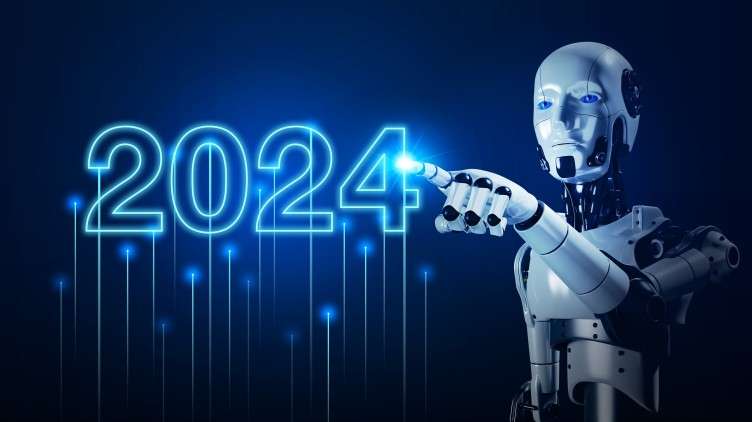The rapid advancement of Artificial Intelligence (AI) is reshaping every facet of modern life and business, pushing the boundaries of what technology can achieve in 2024. From enhancing healthcare and revolutionizing transportation to transforming business operations and sparking ethical debates, AI is set to redefine our future. In this article, we delve into the major trends, developments, and transformations that AI is bringing to various sectors this year. AI Revolution in Business.
AI Impact on Daily Life
AI technologies are increasingly integrated into our everyday lives, bringing improvements in healthcare, transportation, and entertainment. Medical advancements powered by AI algorithms are making diagnostics faster and treatments more precise, helping healthcare providers deliver better patient outcomes. AI-powered medical imaging tools can now identify anomalies with higher accuracy, supporting doctors in making early and effective diagnoses.
Transportation is also being transformed by AI, with self-driving cars becoming a closer reality. Autonomous vehicles are not only being tested but are being optimized for safety, efficiency, and accessibility. Meanwhile, the rise of AI-driven personal assistants has enhanced the way people interact with technology, as virtual assistants now provide everything from personalized recommendations to seamless appointment scheduling.
The Future of AI: Toward General Intelligence
Looking ahead, the journey toward Artificial General Intelligence (AGI) represents a milestone for AI development. Unlike narrow AI that performs specific tasks, AGI aims to create systems that can learn, reason, and adapt like human beings. Although AGI is not yet fully realized, research is gaining momentum, with scientists exploring how to replicate complex human cognitive functions. Potential applications of AGI span from addressing global issues to enabling major scientific breakthroughs, potentially marking a new era in AI evolution.
Innovations in AI Technology
Several technological advancements are propelling the AI field forward, particularly in natural language processing (NLP) and computer vision. NLP breakthroughs are enabling machines to understand and respond to human language more naturally. Chatbots and conversational AI platforms are now used in customer service, translating languages, and assisting in content creation.
Computer vision, another pillar of AI, is becoming a powerful tool in industries like security, manufacturing, and healthcare. From facial recognition to detecting diseases in medical imaging, the implications of these advancements are vast, allowing businesses to leverage AI for automation, safety, and efficiency.
Developments in AI Robotics and Virtual Assistance
Robotics and virtual assistance are two rapidly evolving areas in the AI landscape. Robots are now capable of working alongside humans in various industries, performing tasks that require high precision or pose risks to human workers. For example, in manufacturing and logistics, robots are used for tasks such as assembling, packing, and quality inspection, which enhances productivity and reduces operational costs.
Virtual assistants like Alexa, Google Assistant, and Siri have become part of daily life, helping users organize schedules, control smart home devices, and answer queries. Enhanced by NLP, these AI systems continue to become more intuitive and context-aware, making them reliable for both personal and business use.
The AI Revolution in Industries
AI is bringing revolutionary change across various industries, with automation and data-driven insights taking center stage. In finance, AI algorithms analyze large datasets for better investment decisions, fraud detection, and customer service automation. Healthcare is experiencing AI-led transformations in diagnostics, drug discovery, and patient care management. Retail, too, is leveraging AI to personalize customer experiences and optimize inventory management.
However, with these advancements comes the need for ethical considerations. Issues such as privacy, transparency, and bias have sparked discussions on regulating AI to ensure responsible use. As industries continue to adopt AI, balancing innovation with ethics will be crucial.
Transforming Business with AI
In 2024, businesses are adopting AI-driven strategies to streamline operations and gain a competitive edge. Predictive analytics powered by machine learning enables companies to forecast market trends, improve decision-making, and tailor customer experiences. Through AI, companies can provide personalized recommendations, optimize supply chains, and even automate routine tasks. AI Revolution on Business
For example, e-commerce platforms use AI to offer product suggestions based on browsing history, while manufacturing firms deploy AI to predict equipment failures. By automating repetitive tasks, AI helps companies reduce operational costs and free up human resources for more strategic roles, ultimately improving overall efficiency. AI Revolution on Business
Key AI Trends for 2024
Several key trends are set to shape AI in 2024:
- Human-AI Collaboration: Rather than replacing humans, AI will work alongside them, enhancing productivity and enabling higher-value tasks.
- AI Ethics and Regulation: As AI usage grows, governments and organizations are increasingly focused on establishing ethical guidelines and regulatory frameworks.
- Industry-Specific AI Applications: Different sectors are exploring unique AI applications, from healthcare’s focus on diagnostic accuracy to finance’s use of AI for fraud prevention.
- Sustainability in AI: Energy-efficient AI models and green computing practices are emerging, addressing the environmental impact of AI training and deployment.
These trends highlight the exciting yet responsible future of AI, paving the way for collaborative, regulated, and sustainable AI use across various fields.



